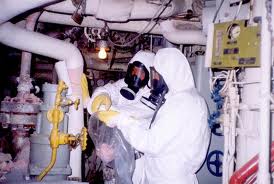
Addressing a series of first impression maritime law issues in the Eastern District of Pennsylvania, a judge has ruled that a ship doesn’t qualify as a product for the purposes of products liability and that makers of the components of those ships don’t have a duty to warn “sophisticated” users about hazardous products, like asbestos.
In addressing the sophisticated user and sophisticated purchaser doctrines, U.S. District Judge Eduardo C. Robreno of the Eastern District of Pennsylvania dealt with issues that have split both state and federal courts.
The case, Mack v. General Electric, stemmed from asbestos exposure on a Navy ship. It has been consolidated in the expansive asbestos multidistrict litigation.
The intent of maritime law, he said, is first “to protect maritime workers from the perils of working at sea” and, second, “to promote and protect maritime commercial activity.”
By adopting the “sophisticated user” defense, Robreno has allowed for manufacturers to establish that some people who used their products can’t hold them liable because the user is “sophisticated,” because of education or training, regarding the hazards of the product — in this case, asbestos.
However, he said, “existing jurisprudence is inconsistent on the issue of whether the ‘sophisticated user’ defense may only be raised against negligent failure-to-warn claims, or whether it may also be raised against strict liability claims pertaining to defective or inadequate warnings. This court holds that the maritime law ‘sophisticated use’ defense recognized herein serves only to bar the former.”
The defense therefore could only be used against claims alleging that the manufacturer was negligent by failing to warn, not against claims of a defective warning, Robreno said.
He declined to adopt a standard for a “sophisticated purchaser” defense, though. Under that theory, the maker of a hazardous product sheds its liability for injury to a user of the product if it has adequately warned the buyer — in this case, the U.S. Navy — about the risks associated with its product.
Recognizing that defense would effectively “discourage work at sea and, in turn, impair rather than promote maritime commerce,” Robreno said. Also, it would deprive seamen and their survivors of redress because they can’t bring a claim against the U.S. government for asbestos-related injuries during their service, he said.
“As such, the recognition of a sophisticated purchaser defense under maritime law would have the effect of thwarting the primary aim of maritime law of protecting and providing remedies for those who work at sea,” Robreno said.
On another issue of first impression addressed by the court, Robreno held that a Navy ship is not a product as defined under strict products liability law.
No state or federal courts have yet addressed whether a Navy ship specifically can be considered a product, according to the opinion. Some other circuits and state courts have considered other vessels in that context and come to varying conclusions.
The burden of warning about potential harm is best borne by the makers of the parts themselves, rather than the shipbuilder that puts the parts together according to the Navy’s blueprint.
“To impose upon a Navy shipbuilder potential liability for each of the thousands (if not tens of thousands) of products assembled in a Navy ship pursuant to Navy specifications, would be an undue, unmanageable, and cumulative burden likely to discourage the activity of shipbuilding,” Robreno said.
He also noted that it makes the most sense that the manufacturer of each part, like turbines, boilers or pumps, would be the most knowledgable about the product and its potential risks, so that manufacturer should bear the burden of warning.
“In light of the court’s conclusion that a Navy ship is not a ‘product’ within the meaning of strict products liability law, summary judgment in favor of these defendants … is warranted with respect to plaintiff’s claims sounding in strict liability,” Robreno said. “As a result, plaintiff’s only viable warnings-related claim against shipbuilder defendants is a negligent failure-to-warn claim.”
Alan Brayton of Brayton Purcell in Novato, Calif., represented James Mack, the plaintiff, and couldn’t be reached for comment.
Marc Brainich of Sedgwick in San Francisco is a lawyer for General Electric, one of the defendants, and declined to comment on the opinion.



